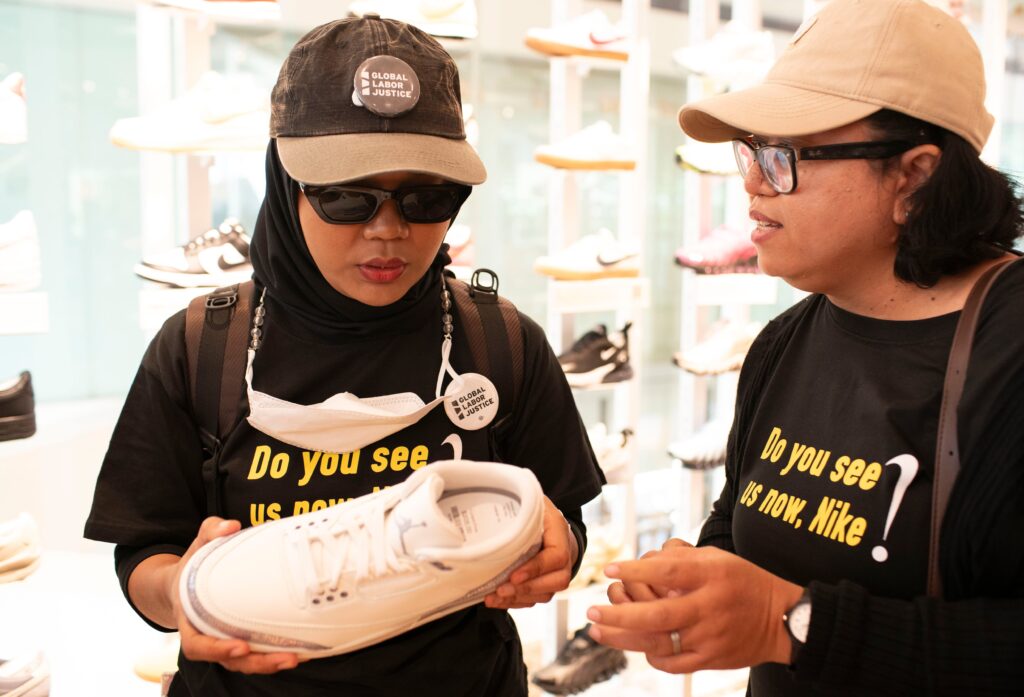On Tuesday, Dedhe Nurhasanah held an Air Jordan in
Nike’s
downtown Portland store. She’d seen the model before. She works at an Indonesian factory that makes it.
The shoe’s price: $205. Nurhasanah’s monthly wages: a little bit less.
Nurhasanah is one of three workers from contract Nike factories visiting Oregon this week to talk about low wages and poor working conditions and warn about what tariffs could mean for already vulnerable workers. (A U.S. Trade Court on Wednesday
blocked the Trump administration’s tariffs
, finding it exceeded its authority in declaring an emergency to justify the import taxes.)
“Working in a Nike factory is very exhausting,” said Dinar Swandi, another one of the workers, through a translator. “We work under high (production) targets, and the wage is very low. It’s not enough to cover a family’s daily needs. It’s only enough to cover food and basic needs.”
Each of the workers is part of the
Fight the Heist campaign
, an ongoing effort by garment workers in Indonesia, Cambodia, Sri Lanka, Bangladesh, India and Pakistan, to protest pandemic wages that remain unpaid. The trip was organized by the Asia Floor Wage Alliance and Global Labor Justice, groups which advocate for workers, including higher wages.
“In the garment industry, workers face intimidation and retaliation all the time for their union activity, for demanding better conditions,” said Noah Dobin-Bernstein, a Global Labor Justice organizer. “And to not only do it in your factory, but to take it to another country is a tremendous act of bravery from these workers.”
On Tuesday, wearing shirts that read “Do you see us now, Nike?”, the workers visited Portland’s Nike store.
Each marveled at the store’s wall of sneakers and spoke with pride about the models made in their factories. Swandi, who sews the Nike swoosh on shoes, looked at the stitching on an Air Jordan, one of the sneakers on which she’s worked. She smiled when she pointed out a tag that said the shoe was made in Indonesia.
But the workers also noted the prices.
“The price of the shoes is the same as one month’s salary,” said Leni Oktira Sari, who cuts the material that goes inside the tongue of sneakers, through a translator. “It’s proof that the profit of Nike is high.”
The employees at the Nike store welcomed the workers but asked them to leave after about 15 minutes.
Nike doesn’t own its factories. Instead, it contracts with 535 finished goods factories, which employ nearly 1.2 million workers, according to
its online manufacturing map
.
The company didn’t immediately respond to a request for comment about the surprise store visit by the factory workers.
Nike’s factories sign
a code of conduct
that requires workers get paid enough to meet their basic needs and provide some discretionary income. In its 2021 corporate responsibility report, Nike said most of its factory workers made 1.9 times the minimum wage.
“It’s a lie,” one of the workers said, through a translator.
“It’s a hoax,” said another, in English.
The workers said they make between $190 and about $300 a month, slightly more than the applicable local minimum wage. Each has worked in a Nike factory for at least five years. The Asian Floor Wage Alliance estimates a living wage in Indonesia is about $550 a month.
Two of the three workers visiting Portland work second jobs to make ends meet. One sells coffee during breaks at the factory and works as a driver and a freelance photographer. Another works as a makeup artist at weddings.
“Workers cannot live decently because the wage is not a decent wage,” Oktira Sari said.
Last month, as part of a partnership with The Oregonian/OregonLive, ProPublica
reported that only 1% of the 3,720 workers
at a former Nike contract factory in Cambodia made 1.9 times the minimum wage.
Nike typically publishes a corporate responsibility report in the spring.
Two years ago, the company said it was working with the Anker Research Institute as part of its work to develop a new Global Living Wage Coalition benchmark for Indonesia.
Nike’s corporate responsibility report last year didn’t provide an update on the effort. The company hasn’t published a report this year.
In an hourlong interview with The Oregonian/OregonLive after the short protest, the workers said daily production goals remain punishingly high, with expectations of making 220 pairs of sneakers per hour.
“Because of the high targets, the women workers cannot go to the toilet,” Oktira Sari said. “They do not have time to go to the toilet.”
The workers said overtime and job insecurity have increased since President Trump on April 2
announced a 32% tariff
, or import tax, on products made in Indonesia. Labor activists
worried the tariffs would squeeze factory workers
.
The workers said overtime has increased to meet accelerated production demands ahead of July 9, when a 90-day pause on the tariffs is scheduled to end. One of the workers said her factory hasn’t posted work schedules for after July 9, which has led to rumors that workers will be laid off.
Nearly 30 years ago, in the midst of nearly a decade of criticism about sweatshop conditions in Nike’s overseas factories, another Nike factory worker, Cicih Sukaesih, traveled to Portland from Indonesia and tried to meet with Nike co-founder Phil Knight.
In a letter sent to the organizers of Sukaesih’s trip, Knight wrote that he was “sympathetic” to Sukaesih’s situation after it was determined her factory wasn’t meeting Nike’s standards. Knight noted the problems had been addressed.
But he declined to meet with her, writing to the trip’s organizers that Nike preferred to “engage in dialogue with groups who are interested in constructive, proactive solutions, not those who announced their intentions through news conferences and mean-spirited media campaigns.”
Outside the Nike store on Tuesday, the factory workers and labor organizers spoke with several pedestrians about working conditions in Nike factories.
Not everyone was receptive.
“Go Nike,” said one customer, who held his Nike shopping bag aloft as he exited past the workers.
But several stopped to have conversations about wages and working conditions.
After speaking with the workers for several minutes, Andrew Van der Kleut, who was visiting Portland from Philadelphia, even took time to learn the pro-union chant “hidup buruh,” which means “long live workers” in Indonesian.
“We reap the benefits, and they live in poverty,” Van der Kleut said. “It’s time workers come together and push for better conditions for everyone.”
The workers will next travel to New York City, Philadelphia and Washington, D.C., and meet with various policy and labor groups, including the Portland Association of Teachers, Jobs with Justice and the Action Center on Race and the Economy.
“We want the transnational solidarity from the U.S. allies to support Asian workers who suffered during COVID because of wage theft and also to ensure that the same crisis or some crisis in the future wouldn’t occur,” said Abiramy Sivalogananthan, the South Asia coordinator for the Asia Floor Wage Alliance.
On Thursday, the workers stopped at Nike’s headquarters near Beaverton. They were denied a meeting and asked to leave the campus.
–
Matthew Kish
covers business, including the sportswear and banking industries. Reach him at 503-221-4386, mkish@oregonian.com or @matthewkish.
Our journalism needs your support. Subscribe today to
OregonLive.com
.




More Stories
Indonesian factory workers visit Nike’s Portland store to raise awareness of wages, conditions
Indonesian factory workers visit Nike’s Portland store to raise awareness of wages, conditions
Indonesian factory workers visit Nike’s Portland store to raise awareness of wages, conditions